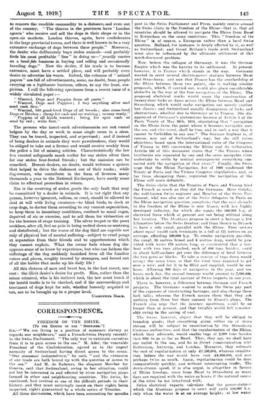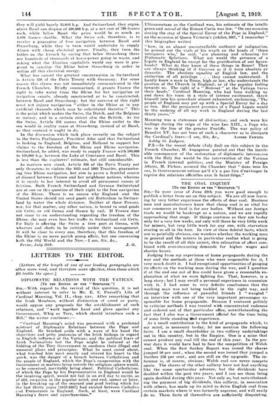CORRESPONDENCE.
FREEDOM OF THE RHINE.
(To urn EDI20a of TIM " SPECEATOt."1
Sia,—" We are living in a position. of economic slavery as regards our neighbours," said' a French-Swiss Deputy recently in the Swiss Parliament. " The only way to: extricate ourselves from it is to gain access to the sea." M. Astor, the venerable President of the Confederation, agreed as to. the urgent necessity of Switzerland having direct access to the. ocean. "Our• economic independence," he said. " and the extension of our trade are both bound up with the question of access to the sea." And M. de Rabours, the. eloquent Member for Geneva, said that Switzerland, owing to her situation, could not but be interested in and affected; by river. navigation plans, formed in other and_ neighbouring countries. The Swiss, he continued, had- arrived at one of the difficult periods in their- history, and they must untiringly insist on their rights being, respected, rights guaranteed by a whole, series of Treaties.
All these discussions, which have been, proceeding for months, past in the Swiss Parliament and Press, mainly centre around the Swiss claim to the freedom of the Rhine—that is, that all countries should be allowed to navigate the Rhine from Basel to Rotterdam on the same conditions. This " freedom of the Rhine" is, of course, a European rather than a local Swiss
question. Holland, for instance, is deeply affected by it, as well as Switzerland; and Great Britain's trade with Switzerland must also be influenced by the ultimate settlement of this much-discussed problem.
Now, before- the- collapse of Germany, it was the. German Empire which was the- barrier to its settlement. At present, however, it is France which stands- in the way. Gerinan wanted to erect several electric-power stations between Basel and. Strassburg; and now that France has the overlordship of the Rhine between those two points, she is making similar proposals, which, if carried out, would also place considerable obstacles in the way of the. free navigation of the Rhine. The proposed. electrical works would mean the construction of twenty-fear locks or• dams across the Rhine between Basel and Strassburg, which would make navigation not merely costlier but slower; and Switzerland equally disapproves of locks and obstructions, whether due- to Germany or to France. She dis- approved of Germany's pretensions because of Artkle 5 of the Paris Treaty of May. 30th, 1814, stipulating that navigation on the. Rhine from the- point whore it becomes navigable unto the sea, and vice rersii, shall be free, and in such a way that it cannot be forbidden to any one." The German bugbear is, of course, now out of Switzerland's war, but she still raises objections based upon the international rules of the Congress of Vienna in 1815 concerning the Rhine and its tributaries. Article 108 'of' this document states. that " the Powers whose territories are separated by one and the same navigable river undertake to settle by mutual arrangement everything con- nected with the navigation of that river." Finally, the Swiss urge that the Rhine Navigation Act of 1868 confirmed the Treaty of Paris and the, Vienna Congress stipulations, and, so fax from abrogating them; regulated- the navigation of the Rhine still more definitely.
The Swiss claim that the Treaties of Paris and Vienna bind the French as much as they did the Germans. Herr Gelpke, the well-known Swiss engineer and Member of the Swiss Par- liainent, who" was-also one of the Swiss delegates to Paris on the Rhine navigation question, complains that the real ob,daele to the freedom of the Rhine is now Alsace, with her highly developed industry; for which she wants the. 600,000 li.p. of electrical force which at present are not being utilized along her frontier. The- Alsatians propose to erect a barrage a few kilometres below the Swiss frontier, and from thence to Brisach to have a side canal, parallel with the Rhine. Four sectors about equal would each terminate in a fall of 124 metres on an averagek affording 100,000 h.p. To render navigation possible, the canal, 85 metres. broad and 6 metres deep, would be pro- vided. with weirs 170 metres long, so constructed that a tow- boat with two tugs attached, each of GOO tons burden, could in about half-au-hour get over the difference of level between the two gates or blocks. To take a convoy of tugs down would cccur.y the same time, so that the total time required to get over a weir, and for it to be filled and emptied, would be one hour. Allowing 300- days of navigation in the year, and ten hours each day, the annual tonnage would amount to 7,000,000, which is about the total amount of Swiss imports in one year. There is, however; a. difference between German and French projects. The Germans. wanted to make the Swiss pay part of the- expenses of constructing barrages, and also, charge them -lock tolls; whereas the French assure them that they, ask nothing. from them but their consent to, Alsace's plans. The French also urge that the journey up-stream would be no longer than at present, and that freights would fall consider- ably owing to the saving of coal.
The Swiss, however, object that they will be obliged to tranship goods; that everything. going either up or down stream will be subject to examination by the Strasaburg Customs authorities; and that the. regularization of the Rhine, which they advocate, would enable tugs of 2,000 tons burden (not 600) to go as far as Basel. Thus, they say, we shall. have our outlet to the sea, and be in direct communication wilt Rotterdam, Antwerp, and London. Moreover, they estimate the-cost of regularization at only £1,200,000, whereas. canalize- . tion before the war would have cost X4,000,000, and now perhaps twice as much. Again, regularization could be done comparatively quickly, and without interrupting traffic. The • down-stream, speed, it is also urged, is- altogether in favour of Rhine freedom, since. from Basel to. Strassburg as many days are required with the weirs as hours if the natural courst of the river be• not interfered_ with.
Swiss. electrical experts calculate that the lower-stations which the Alsatiaas propose to erect will yield 100,000 h.p. only when the water is at an average height; at low water
they will yield barely 35,000 h.p. And Switzerland, they argue, above Basel can dispose of 400,000 h.p. at a net cost of 700 francs each, while below Basel the price would be as much as 1,400 francs—double. What the Swiss ask, therefore, is to receive a guarantee of free navigation between Basel and Strassburg, while they in turn would undertake to supply Alsace with cheap electrical power. Finally, they turn the tables on the French by saying that below Strassburg there are hundreds of thousands of horse-power going to waste, and asking what the Alsatian capitalists would say were it pro- posed to canalize the Rhine below Strassburg in order to utilize all this electrical energy.
What has caused the greatest consternation in Switzerland is Article 358 of the Paris Treaty with Germany. For some reason this clause was not immediately communicated to the French Chamber. Briefly summarized, it grants France the right to take water from the Rhine for her navigation or irrigation canals, already constructed or to be constructed, between Basel and Strassburg; but the exercise of this right must not injure navigation "either in the Rhine or in any artificial channels which may be substituted therefor." This is the point which makes the Swiss, the Dutch, and the Belgians so uneasy, and to a certain extent also the British. As for the Swiss, Article 358 means that the Rhine outlet to the sea would in reality cease at Strassburg, instead of at Basel, as they contend it ought to do.
In the discussion which took place recently on the subject in the Swiss Parliament, President Ador said that Switzerland is looking to England, Belgium, and Holland to support her claims to the freedom of the Rhine and Rhine navigation. Switzerland, he added, was ready to supply France with 100,000 to 150,000 h.p. between the Lake of Constance and Basel. This is less than the engineers' estimate, but still considerable.
As matters now stand, Article 358 of the Paris Treaty not only threatens to violate the 1815 and 1868 Treaties, guarantee- ing free Rhine navigation, but also to prove a fruitful source of discord between France and her neighbour nations, whereas it is surely to her interest to avoid all permanent causes of friction. Both French Switzerland and German Switzerland are at one on this question of their right to the free navigation of the Rhine. There is no reason why England and the United States should not send goods rid Rotterdam to Switzer- land by water the whole distance. Neither of these Powers. nor, for that matter, any other nation, is bound to send goods via Cette, or via Genoa and thence by rail. If France does not come to an understanding regarding the freedom of the Rhine, she may even lose her traffic to Switzerland via Cette, for Italy is offering the Swiss a free port at Genoa, with wharves and sheds to be entirely under their management. It will be clear to every one, therefore, that this freedom of the Rhine is no mere parish pump affair, but one concerning both the Old World and the New.—I am, Sir, &c., Berne, July 26th.



































 Previous page
Previous page